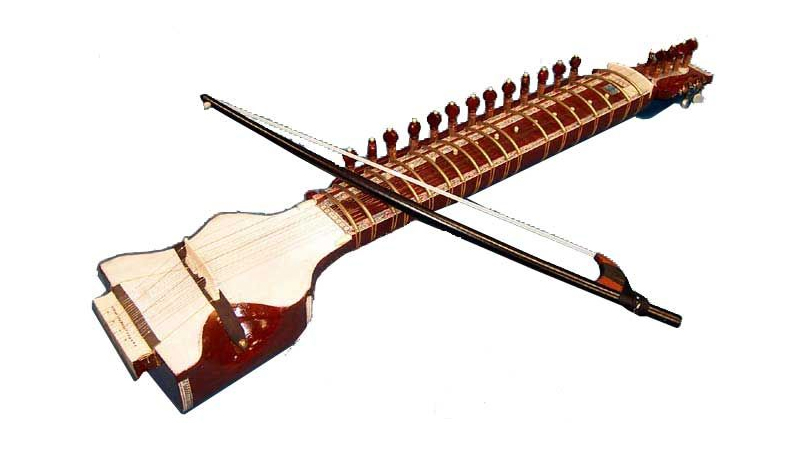Dilruba

The dilruba (also spelt dilrupa) is a bowed musical instrument originating in India. It is slightly larger than an esraj and has a larger, square resonance box. The dilruba holds particular importance in Sikh history.
It attained more global prominence in the 1960s through its appearance in songs by Western artists, such as the Beatles during their psychedelic phase (most notably in the song "Within You Without You").
The name of the instrument derives from the Persianized Hindustani word دلربا/दिलरुबा (dilrubā), literally meaning "that which ravishes or steals the heart."
History of Dilruba Musical Instrument
The dilruba was invented around 300 years ago by the 10th Sikh Guru, Guru Gobind Singh, who based it off of the much older and much heavier taus. His innovations made it more convenient for the Sikh army (the khalsa) to carry the instrument on horseback. Examining the sources in the prior sentences, an attempt has been made, but they have not provided any valid historical connection of the dilruba to the court of Guru Gobind Singh. Rather, the dilruba was widely known to have been created to accompany the Khayal format of singing many decades later, and therefore would not have found itself in Gurbani Sangeet within any of the Sikh Gurus' courts. In fact, traditional kirtan bearers, such as Bhai Avtar Singh Raagi have clarified the history of the dilruba's creation being tied to the patronage of Maharaja Bhupinder Singh and created by Mahant Gajja Singh.
Construction of Dilruba Musical Instrument
The structure of the dilruba has a medium-sized sitar-like neck with 20 heavy metal frets. This neck holds on to a long wooden rack of 12-15 sympathetic strings. The dilruba has four main strings, all of which are bowed and made of metal. The soundboard is a stretched piece of goatskin similar to what is found on a sarangi. Sometimes, the instrument has a gourd affixed to the top for balance or for tone enhancement. The instrument can be rested between the knees while the player kneels, or more commonly rested on the knee of the player while sitting, or also on the floor just in front of the player, with their neck leaning on the left shoulder. It is played using a bow, with the other hand moving along the strings above the frets. The player may slide the note up or down to achieve the portamento, or meend, as is characteristic of Indian music.[6]
दिलरुबा भारत से एक झुका हुआ तार वाला संगीत वाद्य यंत्र है। यह एसराज से थोड़ा बड़ा होता है और इसमें बड़ा और इसमें अनुनाद बक्सा चौकोर होता है। हालाँकि यह पूर्व में उत्पन्न हुआ था वहाँ पहले से ही काफ़ी लोकप्रिय था, 1960 में द बीटल्स ने इसे अपने साइकेडेलिक चरण (psychedelic phase) में ' Within You Without You ' जैसे गीत पर बजाकर इसे पश्चिम में लोकप्रिय किया था।
दिलरुबा का अविष्कार लगभग 300 साल पहले गुरु गोबिंद सिंह (10 वें सिख गुरु) ने किया था, जिन्होंने इसे ताऊस (एक प्राचीन और भारी वाद्य यंत्र) से प्रेरित होकर बनाया था। इसके हल्के होने की वजह से यह इसे अलग-अलग जगह ले जाना आसान पड़ता था, जिस कारण यह खालसा (सिख) सेना इसे घोड़े की पीठ पर लादकर लेकर जा सकती थी। इस प्रकार यह उनके लिए एक सुविधाजनक विकल्प के रूप में उभरा।
वर्गीकरण
- Log in to post comments
- 865 views
